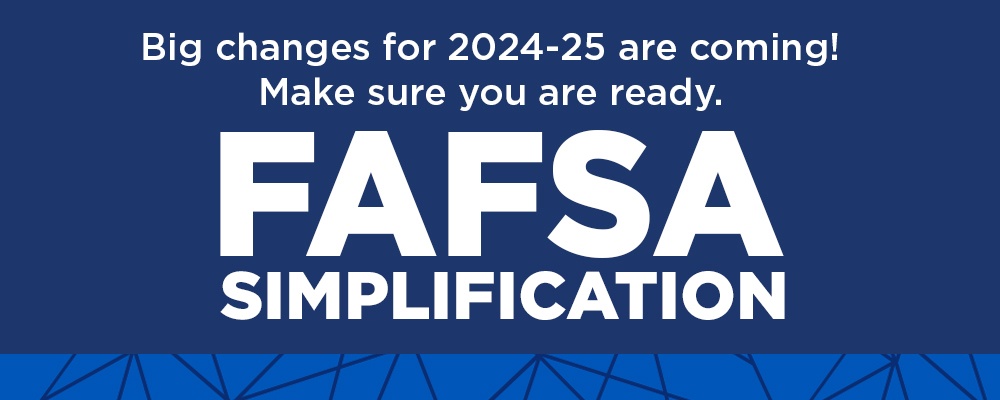
FAFSA Simplification Act — What Does It Mean For YOU?
For the 2024-2025 award year, there will be updates to the FAFSA, with the new application becoming accessible in December 2023. Are you prepared for these changes? How will they impact you and your family?
The FAFSA Simplification Act represents a significant overhaul of the processes and systems used to award federal student aid starting with the 2024-2025 award year. FAFSA simplification changes include the first major redesign of the Free Application for Federal Student Aid (FAFSA®) process in over 40 years. The goal is to make applying for federal student aid easier for students. The 2024-2025 FAFSA will have about 37 questions, instead of 100 questions.
- A more streamlined application process
- Expanded eligibility for federal student aid
- Reduced barriers for certain student populations (e.g., homeless and unaccompanied youth, incarcerated students, English language learners, and students from low-income backgrounds)
- Enhanced data sharing with the IRS to simplify the applicant’s experience
- Get a 2024 – 2025 Federal Student Aid Estimate
- Students and families will find the Free Application for Federal Student Aid, or FAFSA, easier to complete with fewer questions.
- Everyone who enters their information on the FAFSA will be required to create a FSA ID (Federal Student Aid ID), even if they do not have a Social Security Number. All FSA IDs must be set up before starting the FAFSA.
- Every student and parent must have an FSA ID. If parents filed their taxes separately, each parent will need their own FSA ID to enter information and sign the FAFSA.
- Everyone who enters their information on the FAFSA must give the U.S. Department of Education consent to access their federal income tax information from the IRS, even if they did not file a tax return.
- If any contributor to the FAFSA form does not provide consent, submission of the form will still be allowed. However, a Student Aid Index (SAI) will not be calculated.
- Family size will come from the number of exemptions reported on the federal tax return used to complete the FAFSA.
- The result of completing the FAFSA and entering income and asset information has long been known as the Expected Family Contribution, or EFC. It will now be called the Student Aid Index, or SAI.
- The number of household dependents attending college will no longer affect the income/asset calculation.
- Families may now be required to show the value of their small business and/or farm on the FAFSA.
- Males between 18-25 years of age will no longer be required to be registered with Selective Service to receive federal financial aid.
- The FAFSA still must be filled out annually for federal aid consideration. It is available to U.S. citizens or eligible non-citizens.
- Questions introduced in 2023-24 about the applicant’s sex, race, and ethnicity remain only for statistical purposes. They have no effect on federal student aid eligibility.
- Dependency status questions to determine if your parents must provide their information remain the same.
- FAFSA will still request prior-prior year tax information.
| Previous Terminology | New Terminology |
|---|---|
| EFC (Expected Family Contribution) | SAI (Student Aid Index) |
| Parent(s); Parent Spouse; Applicant Spouse | Contributors |
| IDR (Income Data Retrieval) & FAFSA Signature | FTI (Federal Tax Information) and Consent |
| Room & Board | Housing & Food |
| Student Aid Report (SAR) | FAFSA Submission Summary |
